Switching to reusable bags for grocery shopping is key to sustainable shopping. The U.S. uses over 100 billion plastic bags yearly. Reusable bags help cut down on single-use plastics and make shopping greener.
There are many reusable bag options, with 70 unique designs. You can find bags that are machine washable or made from natural fibers like cotton and jute. Using reusable bags for grocery shopping helps the environment and supports sustainable shopping.

Choosing reusable bags for grocery shopping has many benefits. It reduces our use of single-use plastics. The average American uses over 100 billion plastic bags each year. Reusable bags can last from 5 to 500 uses, making them a smart and green choice.
Key Takeaways
- Reusable bags can significantly reduce the accumulation of single-use plastic in households.
- Over 100 billion plastic bags are used in the United States each year, highlighting the need for eco-friendlyalternatives.
- Reusable bags are designed to be used multiple times, with a lifespan of 5 to 500 uses.
- Cotton tote bags can last for years if properly cared for and are 100% biodegradable.
- Reusable bags can replace hundreds of plastic bags over their lifetime if used regularly.
- Some stores impose a surcharge for single-use plastic bags, encouraging the use of reusable options.
Why Switch to Reusable Grocery Bags
Switching to reusable grocery bags can greatly help the environment. Single-use bags use a lot of oil, harming our planet. In fact, 8 percent of the world’s oil goes into making plastic, and 12 million barrels are used for plastic bags in the U.S. each year.
Reusable bags also save money in the long run. The average family uses 1,500 plastic bags a year. Switching to reusable bags can save about $75 a year. Plus, these bags last longer, needing to be replaced less often. Some bags, like those made from cotton or polypropylene, can be used hundreds of times.

- Reduced plastic waste and litter
- Lower environmental impact compared to single-use bags
- Cost savings over time
- Increased durability and strength
Choosing reusable grocery bags helps make our future greener. It’s a small step that can make a big difference.
Common Materials Used in Reusable Bags for Grocery Shopping
Reusable bags come in different materials, each with its own eco-friendly and durability level. Cotton, polyester, and nylon are common choices. Cotton is natural and biodegradable, making it eco-friendly.
But cotton needs a lot of water and pesticides to grow. Polyester and nylon are more durable and can be recycled. Eco-friendly options like hemp and recycled PET are also becoming popular.
Here are some key traits of these materials:
- Cotton: breathable, biodegradable, and natural
- Polyester: durable, water-resistant, and can be made from recycled materials
- Nylon: strong, lightweight, and easy to clean
- Hemp: sustainable, durable, and requires less water than cotton
- Recycled PET: made from recycled plastic bottles, reducing waste and energy consumption

In conclusion, picking the right material for reusable bags is key. It affects their eco-friendliness and durability. By choosing wisely, we can help the environment and live more sustainably. Reusable bags are a smart choice for anyone wanting to cut down on waste.
Different Types of Reusable Shopping Bags
There are many types of reusable shopping bags to pick from. Each has its own special features and benefits. You can find foldable bags that fit in a purse or pocket. Or insulated bags that keep your groceries at the right temperature.
Some popular types of bags include:
- Foldable bags, which are perfect for carrying small items like groceries or personal care products
- Insulated bags, which are ideal for keeping perishable items cool or warm during transport
- Heavy-Duty Canvas Bags, which are great for carrying larger or heavier items
- Mesh Produce Bags, which are perfect for carrying fruits and vegetables
These bags are a smart and green choice instead of single-use plastic bags. They’re great for more than just grocery shopping. By picking the right bag, you help the planet and make a difference.

| Type of Bag | Features | Benefits |
|---|---|---|
| Foldable Bags | Compact, lightweight, easy to carry | Convenient for small items, easy to store |
| Insulated Bags | Keeps items cool or warm, durable | Perfect for perishable items, reduces waste |
| Heavy-Duty Canvas Bags | Sturdy, durable, large capacity | Great for larger or heavier items, long-lasting |
| Mesh Produce Bags | Breathable, lightweight, easy to clean | Perfect for fruits and vegetables, reduces waste |
How to Choose the Right Size and Style
Choosing the perfect reusable bag means thinking about size and style. Your shopping habits also matter. For example, if you buy lots of items, a big bag with a strong handle is best.
A medium tote bag, 15 inches wide by 15 inches high, is great for daily grocery shopping. But, if you carry a lot, go for a bigger size. Think about what you buy and how often you shop to find the perfect size.
Reusable bags come in many materials like cotton, canvas, polyester, and nylon. Each has its own benefits, like durability or being eco-friendly. Pick a style that fits your taste and shopping habits.
Some top picks include:
- Cotton and canvas bags for their durability and value
- Polyester bags for carrying things like lunch boxes and juice bottles
- Jute bags for being eco-friendly and biodegradable
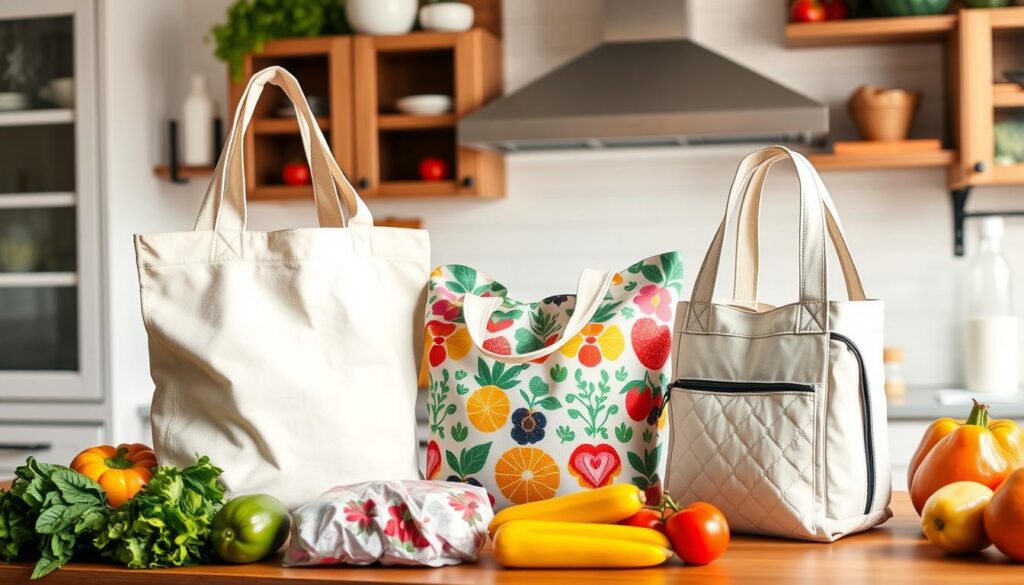
The best size and style of reusable bag depends on your shopping habits and what you like. By thinking about these, you can pick a bag that’s right for you and helps the planet.
| Material | Size | Price Range |
|---|---|---|
| Cotton | Medium | $3-$4 |
| Polyester | Large | $2-$3 |
| Jute | Small | $4 and above |
Benefits of Using Reusable Shopping Bags
Reusable shopping bags are durable and strong, making them a better choice than single-use plastic bags. They are built to last, which means you won’t need to buy new bags often. This makes them a cost-effective choice for shoppers.
These bags are not just durable; they are also versatile. You can use them for grocery shopping or carrying personal items. They come in many styles and designs, letting you show off your personal taste. Many stores even give discounts if you bring your own bag, saving you money in the long run.

- Reduced waste and pollution
- Cost savings over time
- Increased durability and strength
- Versatility in terms of use
- Personal expression and fashion
Using reusable shopping bags is a smart way to cut down on waste, save money, and show off your style. With their lasting quality, flexibility, and many benefits, they are a top choice for those who care about the environment.
Proper Care and Maintenance Tips
To keep your reusable bags in good shape, it’s key to follow some care and maintenance tips. Washing them often is vital to stop bacteria and mold from growing. Studies show many reusable bags carry E. Coli and other germs. These can be wiped out with the right washing techniques.
Here are some tips to keep your reusable bags clean and safe:
- Wash cloth and canvas bags after each use, using the hottest water possible.
- Recycled plastic bags can be washed by hand in warm soapy water.
- Nylon bags can be washed by hand or on the gentle cycle in a washing machine.
It’s also important to note that bags for dry goods can last longer between washing than those for raw meats, seafood, and eggs. Using color-coding or labels helps keep bags for different items separate. This reduces the chance of cross-contamination.
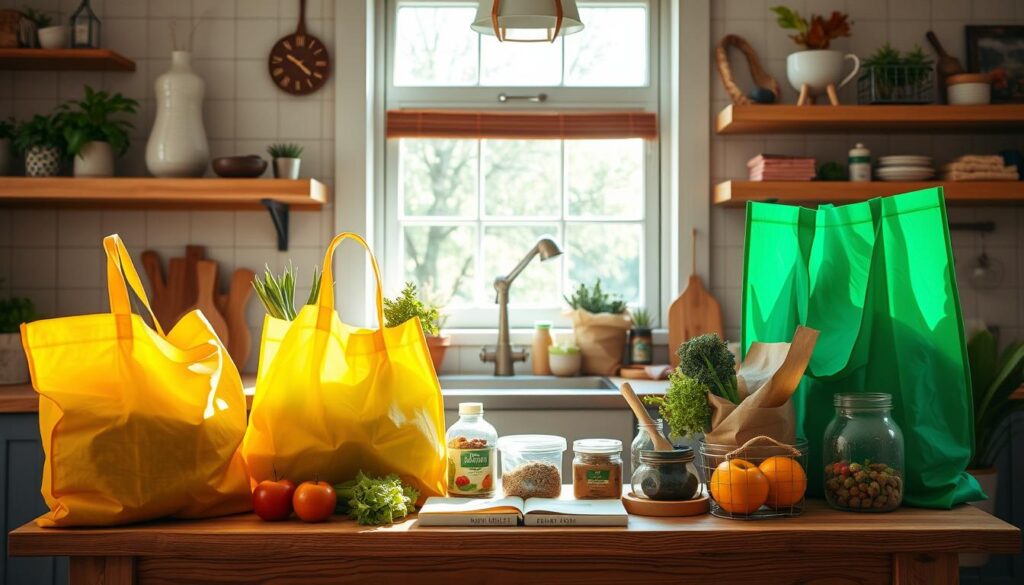
By following these easy maintenance tips, you can make your reusable bags last longer and stay clean. Always wash your bags regularly to stop bacteria and mold. And always check the care label for the right washing instructions.
Making the Most of Your Reusable Bags
To get the most out of your reusable bags, you need a good organization system. Keep them in a spot near your front door. This makes them easy to find when you leave.
When loading your bags, spread the weight evenly. This is key, as it prevents damage to the seams. It’s more important for bags made of thinner materials.
Here are some tips for optimal weight distribution:
- Place heavier items, such as canned goods or bottles, at the bottom of the bag
- Use smaller bags for lighter items, like produce or bread
- Avoid overloading your bags, as this can cause them to tear or become difficult to carry
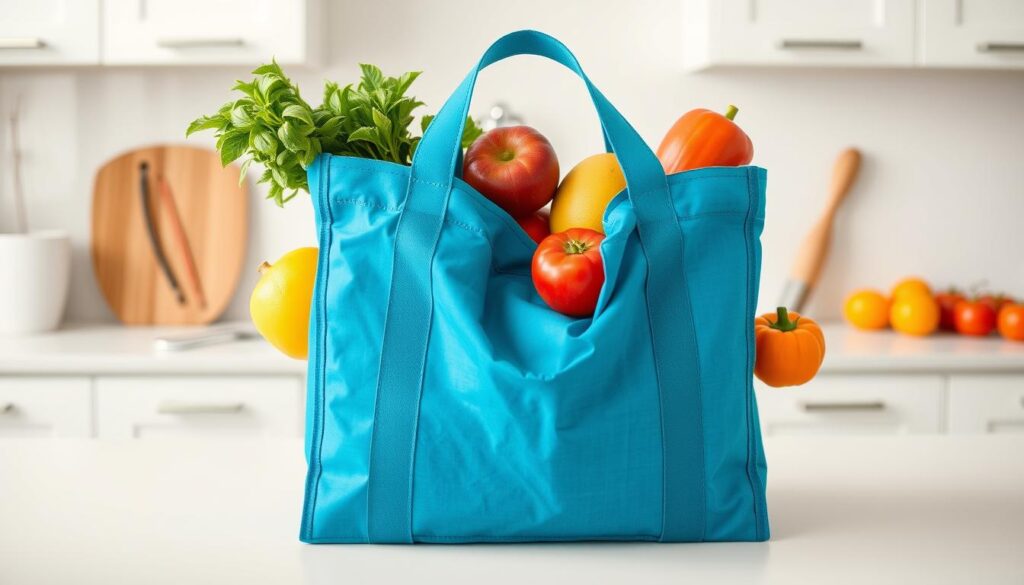
By following these simple tips, you can make your reusable bags last longer. Always check them for damage before use. Also, clean them often to avoid bacteria and bad smells.
| Bag Type | Weight Capacity | Material |
|---|---|---|
| Foldable Bag | 10-15 lbs | Nylon or Polyester |
| Insulated Bag | 20-25 lbs | Thermal Insulation |
| Heavy-Duty Canvas Bag | 30-40 lbs | Canvas or Cotton |
Storage Solutions Between Shopping Trips
Storing reusable bags needs a space-saving method. This keeps them organized and simple to find. Sort bags by use to avoid clutter. For instance, keep produce bags apart from those for dry goods.
Many people face the problem of too many reusable bags. Some have thrown away dozens after sorting. To prevent mess, limit the number of bags and wash them often. You can use plastic wet wipe cylinders or make DIY organizers from items like glue and elastic.
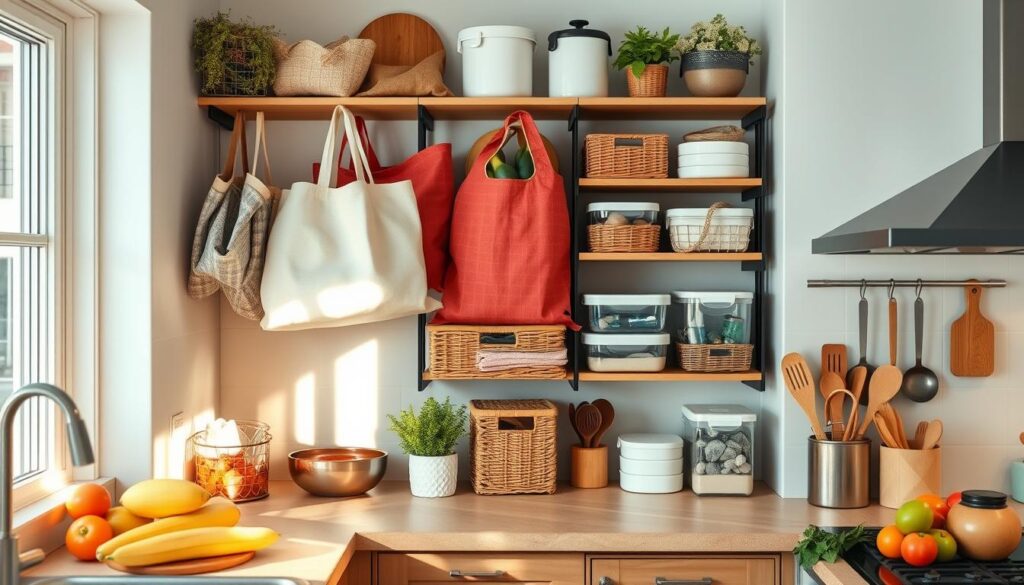
- Sort bags by category to minimize clutter
- Use space-saving storage solutions like plastic wet wipe cylinders or DIY organizers
- Regularly wash bags to prevent foodborne illnesses
- Consider using a storage solution like the Over the Cabinet Grid Cabinet Door Organizer, which can be found at retailers like Wayfair
Using these storage tips helps keep your bags tidy. This makes them easier to use, cutting down on waste. With a bit of creativity, you can find a space-saving way to organize your reusable bags.
Environmental Statistics and Impact
Recent studies show that single-use plastic bags harm our environment a lot. The U.S. alone goes through billions of these bags yearly. But, using reusable bags can help cut down on plastic waste and lower our carbon footprint.
Research shows that cotton bags need to be used 131 times to match the environmental impact of plastic bags. Nonwoven polypropylene bags need to be used about 11 times to have a similar effect. This shows how important it is to pick the right reusable bag and use it often to protect our planet.
Some important environmental facts to remember include:
- Americans use and throw away 100 billion plastic bags every year.
- Only about five percent of plastic bags are recycled.
- Plastic bags have the least environmental impact compared to paper or cotton bags.

By knowing these environmental facts and making small changes in our daily lives, we can greatly reduce plastic waste and our carbon footprint. This helps us move towards a greener future.
| Bag Type | Reuse Requirement | Environmental Impact |
|---|---|---|
| Cotton Bag | 131 times | High |
| Nonwoven Polypropylene Bag | 11 times | Medium |
| Plastic Bag | N/A | Low |
Common Mistakes to Avoid
Using reusable bags can be very helpful, but there are mistakes to watch out for. Avoiding mistakes like not washing bags often can cause bad smells and germs. It’s a best practice to wash them regularly to keep them clean and in good shape.
Choosing the wrong size bag is another mistake. A bag that’s too small might get too full and break. A bag that’s too big can be hard to carry. Picking the right size helps you use your bags better.
Here are some more best practices for using reusable bags:
- Regularly clean and take care of your bags
- Keep your bags in a place that’s easy to reach
- Use your bags for all kinds of shopping, not just groceries

Knowing these mistakes and following best practices can help you use your reusable bags well. Avoiding mistakes like forgetting bags or not using them often can also help. This can make your shopping more sustainable and reduce plastic waste.
| Reusable Bag Size | Recommended Use |
|---|---|
| Small | Produce, bread, and other small items |
| Medium | Groceries, household items, and other medium-sized loads |
| Large | Bulk items, heavy loads, and other large quantities |
Building Better Shopping Habits
Good shopping habits can really help the environment. By remembering to bring bags, we can all make a difference. Creating routines is key to reducing waste and being more sustainable. Food Shopper Insights found that 29 percent of people used reusable bags last time they shopped.
Starting a routine is easy. Just keep your reusable bags where you can see them, like by the door or in the car. This makes it a habit. Stores also offer discounts and points for using these bags, making it more appealing.

- Keeping reusable bags in a visible and accessible location
- Creating a routine, such as always keeping bags in the car
- Taking advantage of incentives, such as discounts or loyalty programs
- Educating oneself on the benefits of using reusable bags and the impact on the environment
By using these tips, we can all help reduce waste and protect our planet. Remembering to bring bags and making it a part of our routine is important. It’s a small step towards a greener future.
Local Regulations and Incentives
Many cities and states have put in place local regulations to cut down on single-use plastic bags. These rules often include bag bans or fees. Studies show these measures can really help reduce plastic bag waste. For example, a $0.05 fee on disposable bags led to a 42 percent drop in plastic bag use.
Some stores also offer incentives for using reusable bags. Target, for instance, gives a five-cent discount for each reusable bag used. These rewards can motivate people to choose reusable bags over single-use ones.
There are many examples of local regulations in action. California banned plastic bags statewide in 2014. New York followed suit in 2020. These bans show a growing effort to cut down on plastic bag waste and encourage reusable bags.

| State | Regulation | Year Implemented |
|---|---|---|
| California | Statewide ban on plastic bags | 2014 |
| New York | Statewide ban on plastic bags | 2020 |
| Hawaii | County-level ban on plastic bags | Varying years |
Smart Shopping Tips with Reusable Bags
Using reusable bags is just the start of smart shopping. To get the most out of your shopping and cut down on waste, try these tips and tricks. Studies show that making and sticking to a shopping list can lower your grocery bill and reduce store trips.
Smart shopping means buying perishables in smaller amounts and more often. It also means using reusable bags and picking items with recyclable packaging. These tips help cut down on food waste and make shopping greener.
Here are more tricks to remember:
- Use bulk bins for exact amounts and less waste
- Support local farmers for fresher food and less waste
- Choose smaller baskets over big carts for better shopping
By using these smart shopping tips and tricks, you can shop more efficiently and eco-friendly. You’ll make a big difference for the environment and your community.
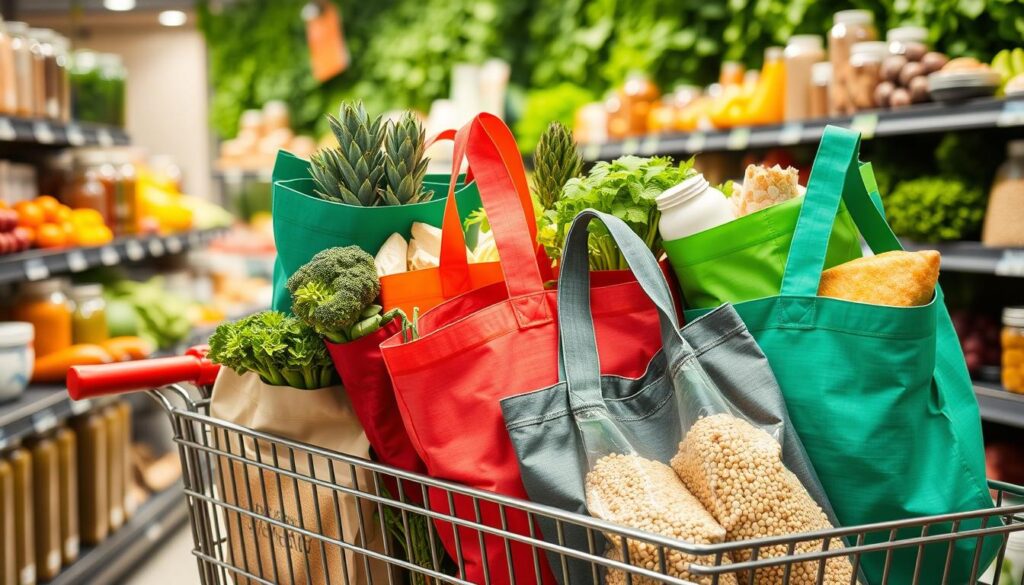
Conclusion: Embracing a Sustainable Shopping Future
As we wrap up our look at reusable bags for grocery shopping, it’s clear we can have a sustainable future. Switching to eco-friendly shopping with reusable bags helps us all. Together, we can make a big difference and create a cleaner, greener world.
Did you know over 100 billion plastic bags are used every year in the U.S.? Most of them end up in landfills or oceans. But, thanks to plastic bag bans and taxes in places like Ireland and California, we’re seeing big changes. These efforts have led to a significant drop in plastic waste.
Reusable bags are a simple yet effective way to reduce single-use plastics and save money. By choosing durable, versatile reusable bags, we can make a real impact. Our choice is clear – the future of shopping is sustainable, and it’s up to us to make it happen.
FAQ
What are the environmental benefits of using reusable bags for grocery shopping?
Reusable bags cut down on plastic waste and lower your carbon footprint. They help reduce the use of single-use plastic bags, which harm the environment.
How can using reusable bags save me money over time?
Reusable bags save money by avoiding the need to buy single-use plastic bags. Stores may also offer discounts for using them, adding to your savings.
What are the different types of reusable bags available for grocery shopping?
You can find many types of reusable bags, like foldable, insulated, heavy-duty canvas, and mesh produce bags. Each type has its own benefits for different shopping needs.
How do I choose the right size and style of reusable bag for my grocery shopping?
Think about your shopping habits and what you usually buy. Choose a bag that fits your needs and lifestyle.
What are the benefits of using reusable shopping bags beyond just the environmental impact?
Reusable bags are durable, versatile, and let you show off your style. They’re great for more than just groceries, making them practical and fashionable.
How do I properly care for and maintain my reusable bags?
Follow the care instructions from the manufacturer. This might include washing them by machine or hand. Proper care and storage can make your bags last longer.
What are some tips for making the most of my reusable bags during the shopping experience?
Use organization systems and load your bags effectively. Pay attention to how you distribute weight to make shopping easier and more convenient.
How should I store my reusable bags between shopping trips?
Store your bags in a closet, drawer, or designated spot when not in use. Look for space-saving options like foldable bagsto keep them organized and easy to find.
What are the common mistakes to avoid when using reusable bags?
Don’t forget your bags, neglect to wash them, or pick the wrong size or style. Being aware of these mistakes can help your bags stay effective.
How can I build better shopping habits to remember to use my reusable bags?
Make a routine, like keeping bags in your car or near the door. This can help you remember to use them. Making reusable bags a part of your routine can make it a habit.
How do local regulations and incentives impact the use of reusable bags?
Many places have bag bans or fees, making reusable bags essential. Stores also offer rewards or discounts for using them, encouraging the switch.
What are some smart shopping tips to keep in mind when using reusable bags?
Pack efficiently, distribute weight evenly, and use features like pockets or compartments. These tips can make shopping with reusable bags more streamlined and waste-reducing.